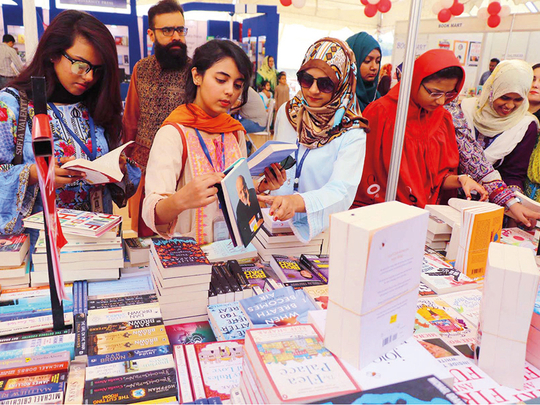
More than 200 Pakistani and 30 international authors and speakers are in attendance at the Karachi Literature Festival, which opened on February 9 and will conclude on February 11.
The 9th Karachi Literature Festival (KLF) is a treat for local literati as it features an array of talks, interviews, panel discussions, readings, book launches, Urdu and Sindhi poetry symposium, stand-up comedy, performing arts, film screenings, book fair and every book lover’s favourite author signings.
Addressing the inaugural ceremony, the KLF founder Ameena Saiyid said that “Since 2010, KLF has become the mother of all festivals in the country as it gave birth to literary, musical, film and theatre festivals in Lahore, Hyderabad, Faisalabad and Gwadar.”
The literature festival, she said, is not just an event but it’s a struggle to bring academia, scholars and artists at one platform. “The KLF is not just a festival. It is a movement. It is a mini-university as it affords Pakistanis an opportunity to broaden their horizons, to gather courage to speak out against the inequities of society,” remarked Saiyid, Oxford University Press (OUP) Pakistan Managing Director.
When the event began in 2010, Saiyid recalled, a mere 5,000 people attended it, whereas the number had risen to 200,000 in 2017. This year, at least 250 speakers and performers are participating in the festival with some 75 sessions lined up, she observed.
Recalling that the mayor of London during his visit to Karachi had described London as the greatest city of the world and as one open for culture and tourism, she said: “As a citizen of Karachi, I say Karachi is the greatest city in the world. Karachi is open for business, culture, literature and tourism.”
Literature festivals had a vital role in stimulating dialogue among diverse groups and foster harmony, said Adrian Mellor, managing director of the Oxford University Press, UK, speaking at the event.
British historian Dr Francis Robinson delivered an insightful lecture on literature and history in Muslim South Asia. Citing examples from the novels of Pakistani writers, Nadeem Aslam, Mohammad Hanif and Moni Mohsin, Dr Robinson said he found three themes important — martial law, the great transformation of feudal class, and the nature of upper-middle class life of the urban areas.
Novelist and playwright Noorul Huda Shah, German Counsel-General Rainer Schmiedchen, Italian Counsel-General Anna Ruffino, French Counsel-General Francois Dall’Orso, Indian High Commissioner Ajay Bisaria, British Deputy High Commissioner Alan Burns and US Counsel-General Grace Shelton also addressed the gathering.
During the event, awards were also presented to Pakistan’s promising writers. The first prize was awarded to Dr Rasul Bakhsh Rais for his book, ‘Imagining Pakistan’. The KLF-Pepsi Non-Fiction Prize went to Omar Shahid Hamid for his book, ‘The Party Worker’ while Altaf Fatima won the KLF-Getz Pharma Prize for Fiction (Urdu).
Among the many literary stars participating are Abdul Malik Baloch, Amir Adnan, Arieb Azhar, Arif Hasan, Attiya Dawood, Hameed Haroon, Hamid Khan, Harris Khalique, I.A. Rahman, Iftikhar Arif, Ishrat Husain, Javed Jabbar, Kaiser Bengali, Kishwar Naheed, Mahtab Akbar Rashdi, Mujahid Barelvi, Raza Rabbani, Sabyn Javeri, Salman Ahmad, Sania Saeed, Sheema Kermani, Zafar Hilaly and Zubeida Mustafa.
The international authors include Kesho Scott, A.G. Noorani, Saif Mahmood, Sheela Reddy, Y Venugopal Reddy, Amarjit Chandan, Isambard Wilkinson, Jose Oliver, Jurgen Wasim Frembgen, Ibrahim Waheed Ogaru, Aurelie Salvaire, Amardeep Singh, Claire Chambers, Kamila Shamsie and Victoria Schofield.












